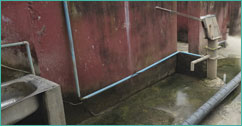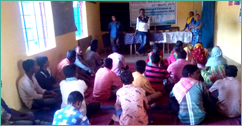 Social Education for Environment and Development (SEED)
Social Education for Environment and Development (SEED)During the rainy season, the latrine's pit was being filled with rain w ater causing spillage of faecal matters inside the toilets. The clay soil in the area makes filtration very quickly which required a new system even when rainfalls are very intense. Since using a soak pit had to result the same problems a new system of horizontal sand filter was used. Finding a location to collect the effluent was very difficult as the outlet of the filter was more than 60 cm deep. A long trench (60 metres) outside the campus was dug to reach an existing trench beside the pond. This was quite complex because a slope was to made to prevent water flow. The horizontal sand filter is made of layer of sand and gravel (around 30 to 35 cm) where filtration occurs and micro-organisms purify the effluent from the twin pits. This kind of construction implies filtrations pipes made from normal pipes which have been partially cut with 5 mm slits, concrete boxes (inlet and outlet), a plastic sheet and geo-textile brought from France to prevent entrance of soil in the filter. Effluent from latrine is therefore partially treated now. This water is suitable for gardening; for this reason a water tank was built with 1-meter-diameter concrete rings. This sand filter also receives liquid from the new urinal which is located near the twin pits. After a period it could be necessary to remove the gravel layer at the entrance of the filter to clean or change it. This aims to allow infiltration rate in the filter to become sufficient again.
ater causing spillage of faecal matters inside the toilets. The clay soil in the area makes filtration very quickly which required a new system even when rainfalls are very intense. Since using a soak pit had to result the same problems a new system of horizontal sand filter was used. Finding a location to collect the effluent was very difficult as the outlet of the filter was more than 60 cm deep. A long trench (60 metres) outside the campus was dug to reach an existing trench beside the pond. This was quite complex because a slope was to made to prevent water flow. The horizontal sand filter is made of layer of sand and gravel (around 30 to 35 cm) where filtration occurs and micro-organisms purify the effluent from the twin pits. This kind of construction implies filtrations pipes made from normal pipes which have been partially cut with 5 mm slits, concrete boxes (inlet and outlet), a plastic sheet and geo-textile brought from France to prevent entrance of soil in the filter. Effluent from latrine is therefore partially treated now. This water is suitable for gardening; for this reason a water tank was built with 1-meter-diameter concrete rings. This sand filter also receives liquid from the new urinal which is located near the twin pits. After a period it could be necessary to remove the gravel layer at the entrance of the filter to clean or change it. This aims to allow infiltration rate in the filter to become sufficient again.
URINALS
Many schoolgirls urinate in open inside school, which is a source of odours and is not hygienically acceptable. As remedy for this issue, two urinals have been constructed. One is located behind the classrooms and the second one is near the latrine and dormitory. To get rid of urine mixed with water, a trench was dug and then filled with gravel and a 6 meters infiltration pipe. It was then laid with geo-textile and covered with soil. With the idea to collect urine for hydroponic agriculture, a system was specially built to collect urine in a jerry-can allowing the non-used urine to be treated in the sand filter.
WORLD WATER DAY
 SEED organises world water day on 22nd March. Small congregation of participants including local youth, women self-help group members, local PRIs members, school teachers, Anganwadi workers etc discuss on the preciousness of water and its relevance in Malkangiri, the most water deficient and drought prone area with very high temperature . The participants pledge for adopting the ways and means of water conservation. The participants also discuss on combating water pollution, reuse/recharge/recycle the household water and rainwater harvesting technologies.
SEED organises world water day on 22nd March. Small congregation of participants including local youth, women self-help group members, local PRIs members, school teachers, Anganwadi workers etc discuss on the preciousness of water and its relevance in Malkangiri, the most water deficient and drought prone area with very high temperature . The participants pledge for adopting the ways and means of water conservation. The participants also discuss on combating water pollution, reuse/recharge/recycle the household water and rainwater harvesting technologies.
|
|